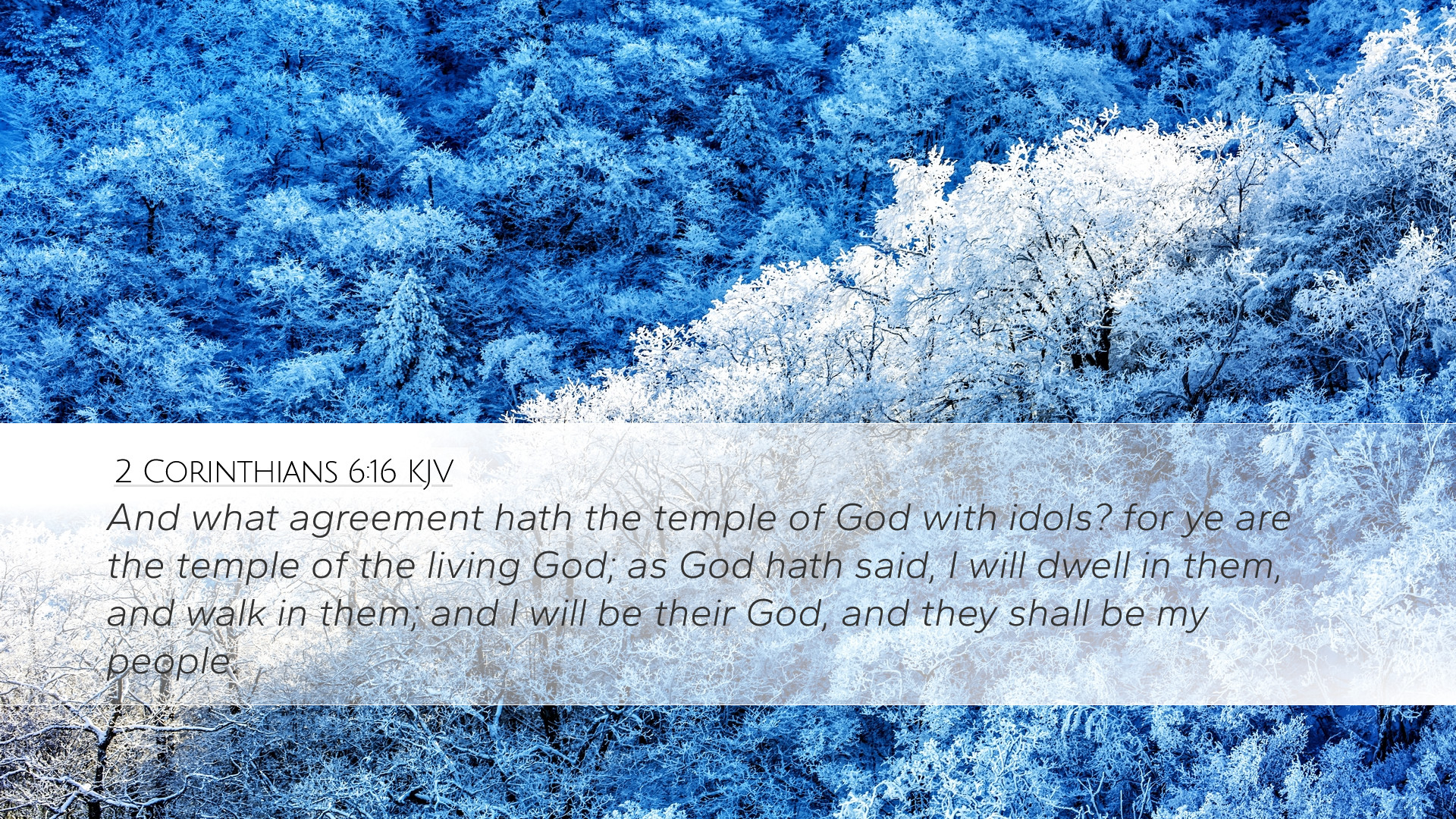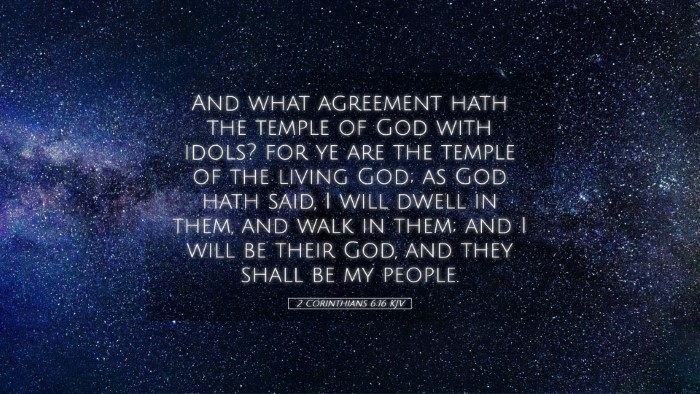Commentary on 2 Corinthians 6:16
Verse Reference: 2 Corinthians 6:16 - "And what agreement hath the temple of God with idols? for ye are the temple of the living God; as God hath said, I will dwell in them, and walk in them; and I will be their God, and they shall be my people."
Introduction
This verse from Paul's second letter to the Corinthians highlights a significant theological principle regarding the relationship between believers and the divine. Paul emphasizes the sanctity of the believer as the dwelling place of God, asserting the incompatibility of idolatry with the worship of the living God. This commentary will synthesize insights from notable public domain commentaries to provide a rich understanding of the implications of this verse.
The Temple of God
Meaning and Significance: The term "temple of the living God" denotes a profound concept for the Christian believer. Paul asserts that believers, collectively as the church and individually as followers of Christ, are not mere structures of worship but living temples. This idea aligns with Jewish traditions where the temple was central to God's presence among His people.
- Matthew Henry: Henry emphasizes that this extraordinary privilege, being the temple of God, brings both great honor and responsibility. The believer's life should reflect the holy nature of this indwelling.
- Albert Barnes: Barnes elaborates on the implications of God dwelling in believers, suggesting that this relationship should lead to a life characterized by holiness, guided by the presence of the Holy Spirit.
- Adam Clarke: Clarke points out that this designation as the temple suggests a community aspect, where the church collectively represents God's presence on earth.
Idolatry and Its Incompatibility
Contrast with Idols: The rhetorical question posed by Paul serves as a stark contrast between the divine and the profane. Idols symbolize false worship and the rejection of God's supremacy. This comparison is significant for understanding the nature of true worship.
- Matthew Henry: He warns that the pursuit of idolatry can lead believers away from God’s presence, destroying the temple they were meant to be. Henry stresses that one cannot serve both God and idols.
- Albert Barnes: Barnes notes that the Corinthians lived in a culture rife with idolatry. He calls believers to separate themselves from the practices and beliefs that compromise their identity as God’s temple.
- Adam Clarke: Clarke discusses the futility of idol worship, arguing that the character of true believers stands in stark contrast to those who bow down to created things rather than the Creator.
Divine Promises
God's Assurance: The promise of God dwelling among His people encapsulates the essence of the covenant relationship. Paul's reference to God’s promises reveals an intimacy that believers are called to experience and maintain.
- Matthew Henry: Henry articulates that this promise comes with the fullness of preservation and protection. God’s presence ensures that His people are guided and sanctified.
- Albert Barnes: He emphasizes that the promise for God to "walk in them" indicates a dynamic relationship where God is not distant but actively involved in the lives of believers.
- Adam Clarke: Clarke reflects on the spiritual implications of being "my people" and illustrates how this personal relationship elevates believers above the world’s standards and practices.
The Call to Holiness
Living as God's Temple: This verse implicitly calls believers to a life of holiness, which reflects their identity as God's chosen people. The implications of being a temple involve a commitment to purity in both personal and communal aspects.
- Matthew Henry: He encourages self-examination and practical holiness, suggesting that believers be mindful of their actions, aligning them with the character of God who dwells within them.
- Albert Barnes: Barnes insists that true devotion must manifest in distinct lifestyles, urging believers to abstain from all forms of idolatry and moral decay.
- Adam Clarke: Clarke stresses that maintaining the temple means constant vigilance against corruption, guiding believers to foster a community grounded in faith and holiness.
Application for Believers
The Challenge of Living as God's Temple: As contemporary believers navigate a world filled with competing ideologies and values, it is crucial to internalize Paul’s message. The challenge is to embrace one’s identity as a temple of the living God, living in a way that honors this sacred status.
- Engagement with Culture: While engaging with the surrounding culture, Christians are reminded to uphold their distinctiveness. This dual existence calls for wisdom in both presence and separation.
- Community and Accountability: The body of Christ functions best when believers encourage one another to fulfill their roles as God’s temple. Accountability plays a vital role in maintaining holiness.
- Perseverance in Faith: Understanding God’s promises provides strength during trials, fostering a deeper reliance on the presence of the living God amidst challenges.
Conclusion
The insights gleaned from the rich tapestry of commentaries on 2 Corinthians 6:16 reveal the profound truth of believers as temples of the living God. In light of this verse, the call to holiness and separation from idolatry serves as an imperative for all who claim to follow Christ. By living out this identity in a way that honors God’s presence, believers can truly shine as lights in a dark world.


